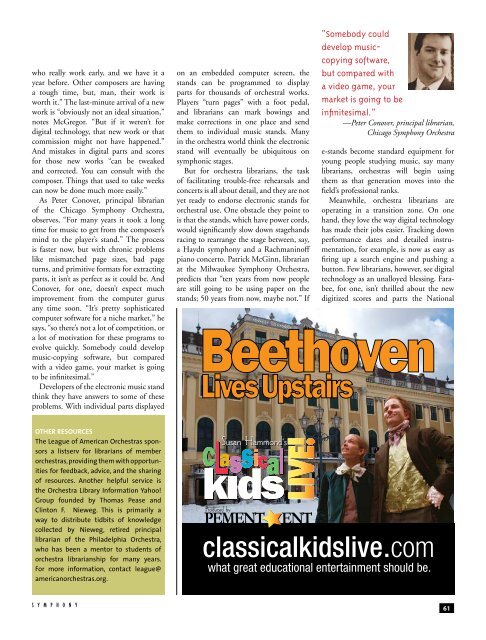A flawless rehearsal? No glitches in last night's world ... - MOLA
A flawless rehearsal? No glitches in last night's world ... - MOLA
A flawless rehearsal? No glitches in last night's world ... - MOLA
Create successful ePaper yourself
Turn your PDF publications into a flip-book with our unique Google optimized e-Paper software.
who really work early, and we have it a<br />
year before. Other composers are hav<strong>in</strong>g<br />
a tough time, but, man, their work is<br />
worth it.” The <strong>last</strong>m<strong>in</strong>ute arrival of a new<br />
work is “obviously not an ideal situation,”<br />
notes McGregor. “But if it weren’t for<br />
dig ital technology, that new work or that<br />
commission might not have happened.”<br />
And mistakes <strong>in</strong> digital parts and scores<br />
for those new works “can be tweaked<br />
and corrected. You can consult with the<br />
composer. Th<strong>in</strong>gs that used to take weeks<br />
can now be done much more easily.”<br />
As Peter Conover, pr<strong>in</strong>cipal librarian<br />
of the Chicago Symphony Orchestra,<br />
observes, “For many years it took a long<br />
time for music to get from the composer’s<br />
m<strong>in</strong>d to the player’s stand.” The process<br />
is faster now, but with chronic problems<br />
like mismatched page sizes, bad page<br />
turns, and primitive formats for extract<strong>in</strong>g<br />
parts, it isn’t as perfect as it could be. And<br />
Conover, for one, doesn’t expect much<br />
improvement from the computer gurus<br />
any time soon. “It’s pretty sophisticated<br />
computer software for a niche market,” he<br />
says, “so there’s not a lot of competition, or<br />
a lot of motivation for these programs to<br />
evolve quickly. Somebody could develop<br />
musiccopy<strong>in</strong>g software, but compared<br />
with a video game, your market is go<strong>in</strong>g<br />
to be <strong>in</strong>f<strong>in</strong>itesimal.”<br />
Developers of the electronic music stand<br />
th<strong>in</strong>k they have answers to some of these<br />
problems. With <strong>in</strong>dividual parts displayed<br />
OTHER RESOuRCES<br />
The League of American Orchestras sponsors<br />
a listserv for librarians of mem ber<br />
orches tras, provid<strong>in</strong>g them with opportunities<br />
for feedback, advice, and the shar<strong>in</strong>g<br />
of resources. Another helpful service is<br />
the Orchestra Library Information Yahoo!<br />
Group founded by Thomas Pease and<br />
Cl<strong>in</strong>ton F. Nie weg. This is primarily a<br />
way to distribute tid bits of knowledge<br />
collected by Nieweg, retired pr<strong>in</strong>cipal<br />
librarian of the Phil adel phia Orchestra,<br />
who has been a mentor to students of<br />
orchestra librarianship for many years.<br />
For more <strong>in</strong>formation, contact league@<br />
americanorchestras.org.<br />
s y m p h o n y<br />
on an embedded computer screen, the<br />
stands can be programmed to display<br />
parts for thousands of orchestral works.<br />
Players “turn pages” with a foot pedal,<br />
and librarians can mark bow<strong>in</strong>gs and<br />
make correc tions <strong>in</strong> one place and send<br />
them to <strong>in</strong>dividual music stands. Many<br />
<strong>in</strong> the orchestra <strong>world</strong> th<strong>in</strong>k the electronic<br />
stand will eventually be ubiquitous on<br />
symphonic stages.<br />
But for orchestra librarians, the task<br />
of facilitat<strong>in</strong>g troublefree <strong>rehearsal</strong>s and<br />
concerts is all about detail, and they are not<br />
yet ready to endorse electronic stands for<br />
orchestral use. One obstacle they po<strong>in</strong>t to<br />
is that the stands, which have power cords,<br />
would significantly slow down stagehands<br />
rac<strong>in</strong>g to rearrange the stage between, say,<br />
a Haydn symphony and a Rachman<strong>in</strong>off<br />
piano concerto. Patrick McG<strong>in</strong>n, librarian<br />
at the Milwaukee Symphony Orchestra,<br />
predicts that “ten years from now people<br />
are still go<strong>in</strong>g to be us<strong>in</strong>g paper on the<br />
stands; 50 years from now, maybe not.” If<br />
�����������<br />
��������������� ���������������<br />
“Somebody could<br />
develop musiccopy<strong>in</strong>g<br />
software,<br />
but compared with<br />
a video game, your<br />
market is go<strong>in</strong>g to be<br />
<strong>in</strong>f<strong>in</strong>itesimal.”<br />
—Peter Conover, pr<strong>in</strong>cipal librarian,<br />
Chicago Symphony Orchestra<br />
estands become standard equipment for<br />
young people study<strong>in</strong>g music, say many<br />
librarians, orchestras will beg<strong>in</strong> us<strong>in</strong>g<br />
them as that generation moves <strong>in</strong>to the<br />
field’s professional ranks.<br />
Meanwhile, orchestra librarians are<br />
oper at<strong>in</strong>g <strong>in</strong> a transition zone. On one<br />
hand, they love the way digital technology<br />
has made their jobs easier. Track<strong>in</strong>g down<br />
performance dates and detailed <strong>in</strong>strumentation,<br />
for example, is now as easy as<br />
fir<strong>in</strong>g up a search eng<strong>in</strong>e and push<strong>in</strong>g a<br />
button. Few librarians, however, see digital<br />
technology as an unalloyed bless<strong>in</strong>g. Farabee,<br />
for one, isn’t thrilled about the new<br />
digitized scores and parts the National<br />
classicalkidslive.com<br />
what great educational enterta<strong>in</strong>ment should be.<br />
61


